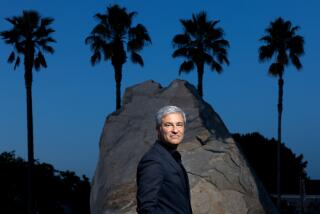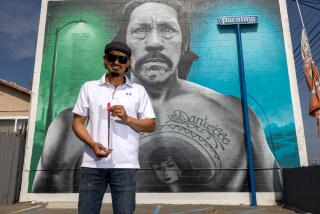Why you should see Hugo Crosthwaite’s L.A.-inspired mural — before he destroys it bit by bit
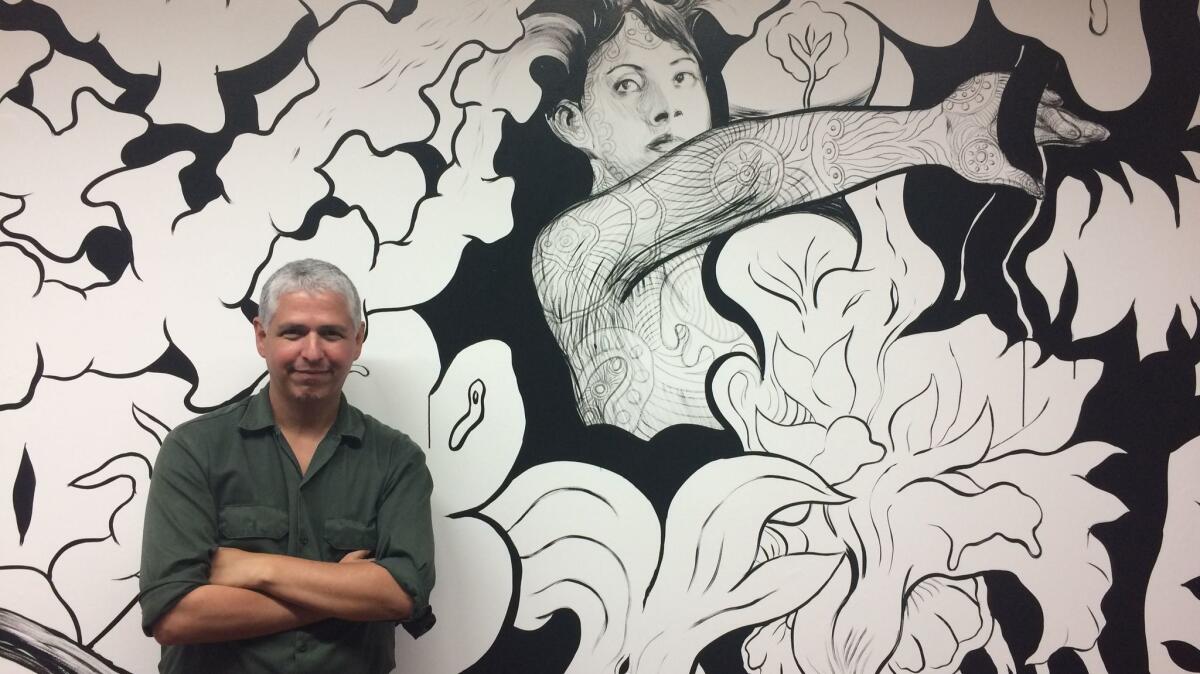
When artist Hugo Crosthwaite walked into the Museum of Social Justice in early September, he had little idea what he was going to do with the walls he’d been commissioned to paint. But over the course of several weeks this fall, the artist let a rambling narrative unfold — one inspired by whatever took hold of him on any given day.
“In Memoriam: Los Angeles,” as the piece is called, takes over just about every piece of available wall space in the museum’s gallery, which is located in the basement of La Plaza United Methodist Church on downtown L.A.’s busy Olvera Street. The mural, created in partnership with the California Historical Society, features a singular mix of images — rendered in the artist’s preferred black and white — inspired by Mexican pulp comics, 19th century French illustration, Southern California visual iconography and current political events. It also features elements drawn from the artist’s dialogues with the hundreds of people that stream through the space on a daily basis.
For the record:
9:25 a.m. Dec. 28, 2017This article was updated with information about the exhibition’s co-sponsor, the California Historical Society.
“I got tourists, I got homeless people,” says Crosthwaite, who is based in Rosarito, Mexico, but works regularly in Southern California. “There were Mexican families who come to Olvera Street on Sunday to listen to music, they would stumble into this.”
To encourage conversation, the artist wore a workman’s shirt that reads “Hugo Rotulos” (“Hugo Signs,” in Spanish). “People are less intimidated,” he explains. “They don’t know if I’m an artist or a sign painter.”
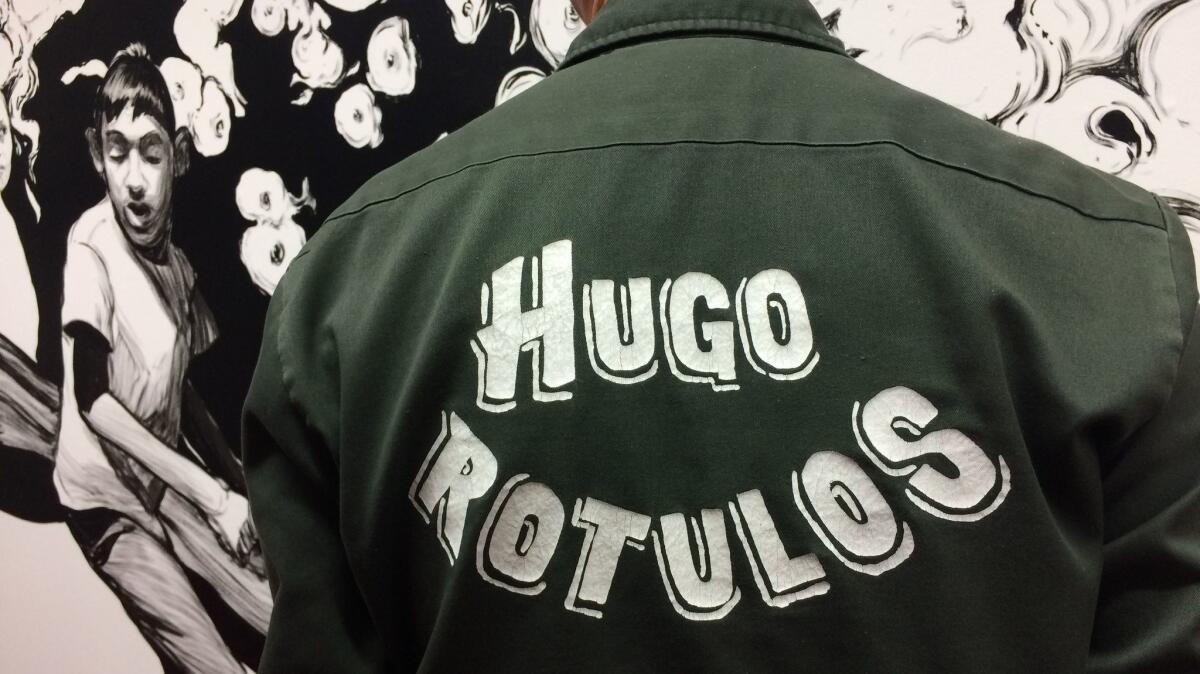
That, he says, encouraged all kind of encounters — including one man who recited the ballads he’d written, and another, who presented his poetry.
It also resulted in dramatic shift in at least one part of the piece, after one particular little girl gave her input.
Before that exchange, “In Memoriam” wasn’t exactly telling a pretty story.
The work began, early on, with an image of a woman in Mickey Mouse ears vomiting a white liquid.
“Because I’m working in L.A.,” Crosthwaite says, “I thought ‘Disneyland.’”
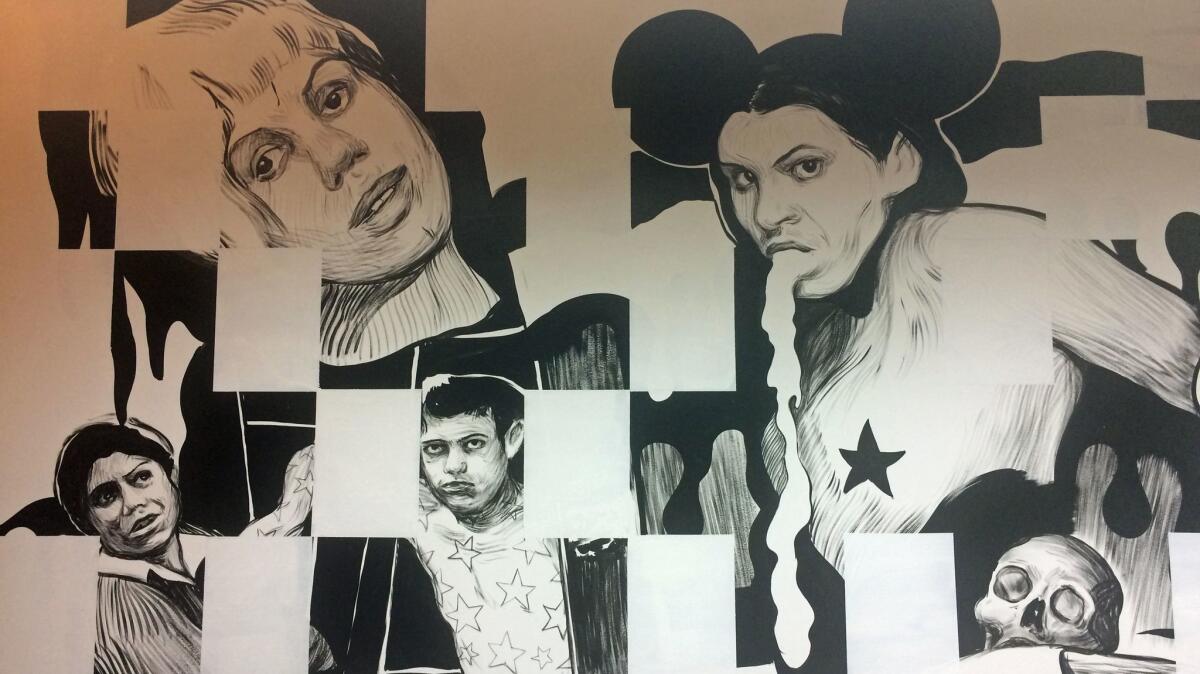
This progressed into scenes that represented our current fraught moment of divisiveness: a bubbling cloud of angry white faces, frightened refugees, a young boy saving another from a noose, a rendering of a star that transforms into the face of a Klan member.
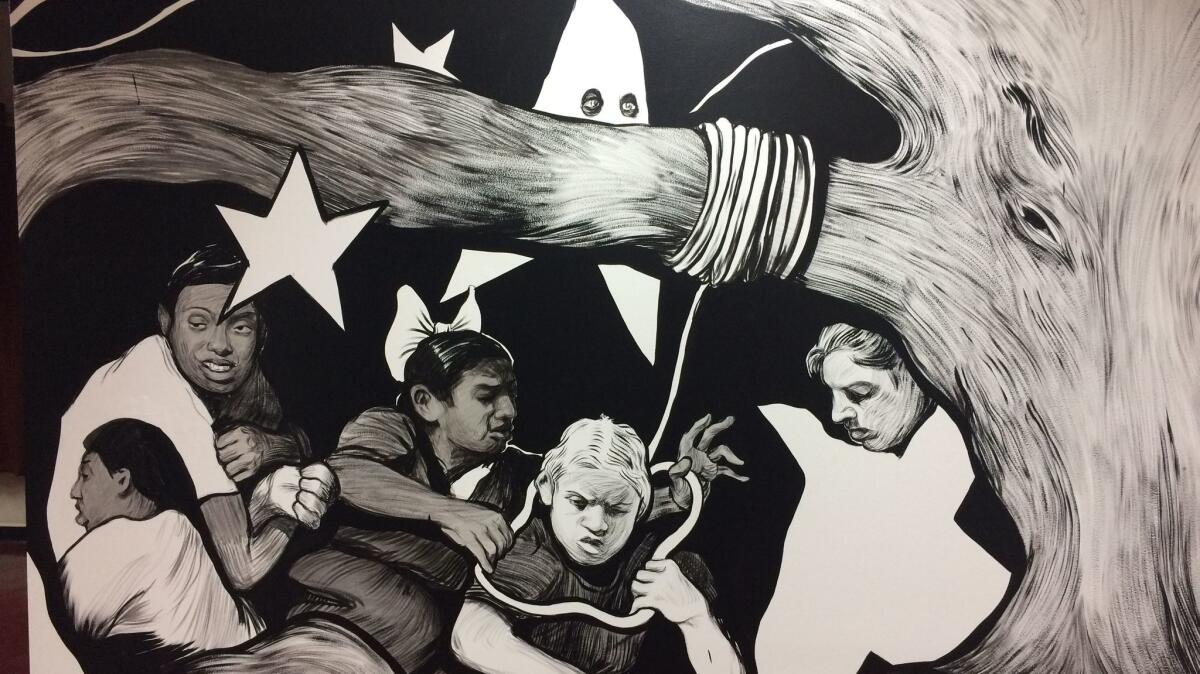
“As I was working, there was an interfaith gathering here to do a march in favor of DACA kids,” says Crosthwaite, referring to the Deferred Action for Childhood Arrivals program, which allowed individuals brought to the United States illegally as children to remain in the country.
“That’s what led me to this part, with the 1950s comic book figures,” he adds, gesturing at the bubbling white cloud filled with enraged faces and contorted mouths. “That’s what Trump wants to do — is go back to this fake idea of the ’50s.”
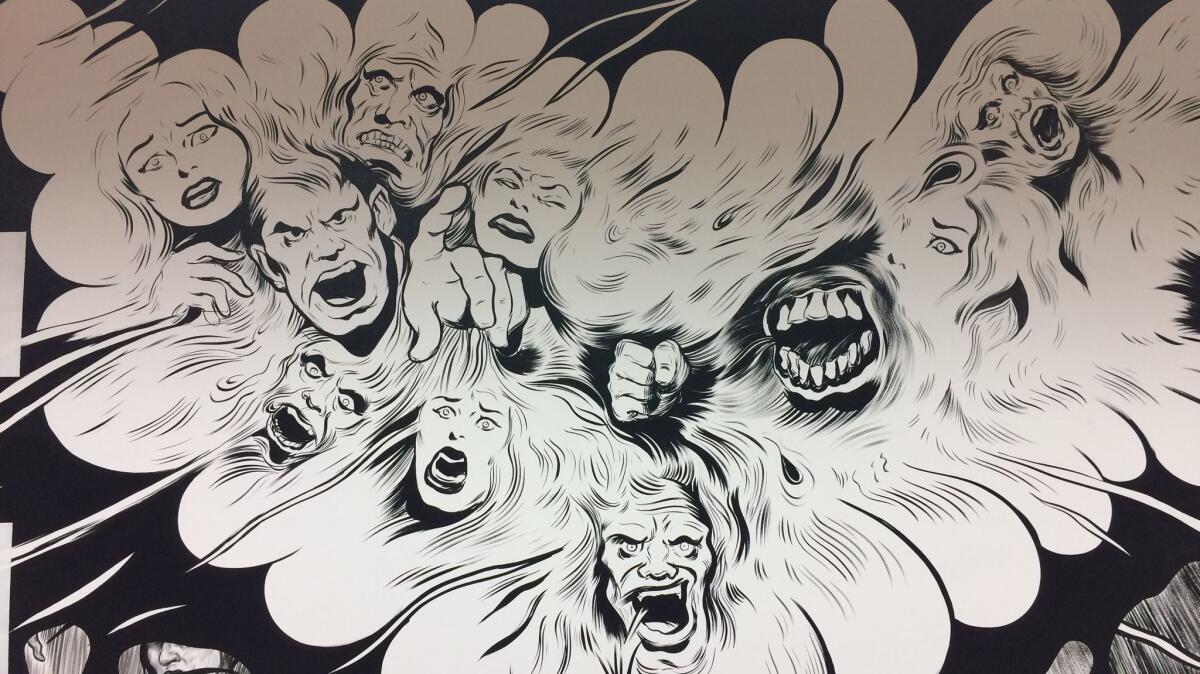
It was while working on these images of anger and death that a little girl entered the gallery.
“She came in and said, ‘When is the mural going to get good?’” Crosthwaite recalls with a laugh. “So I realized that I needed to talk about something else.”
Into his visual narrative, he added an image of a little girl from which blossoms a wall filled with flowers. The dead tree that was binding together elements of the composition is seen coming back to life.
“From death, life,” says the artist.
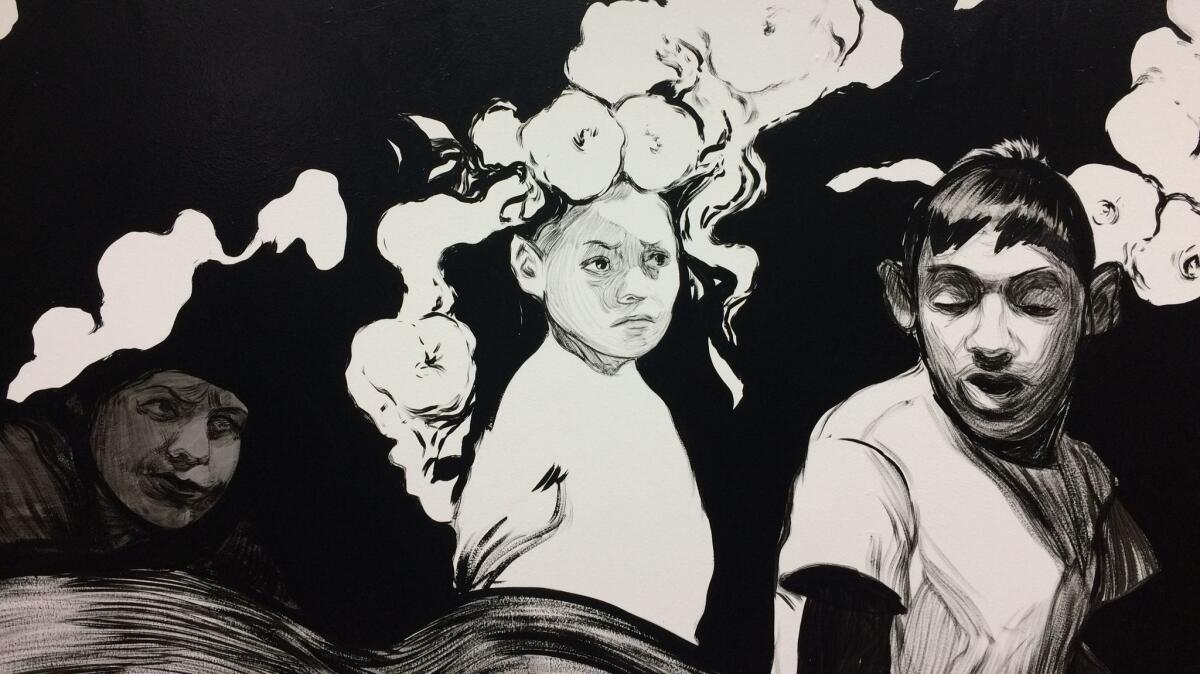
In keeping with this idea, the life of Crosthwaite’s mural will be fleeting. Starting in February, the artist will return to the gallery and start blotting out his work piece by piece, slowly extinguishing the imagery he painted during the course of the fall. By the time the show closes on March 4, “In Memoriam” will be nothing but memory.
“It’s a mural that has a short lifespan,” he explains. “It has a narrative. And once I finish that narrative, I then go and deconstruct it.”
The idea of pulling things apart isn’t new to the artist. In 2015, he created “Shattered Mural,” a piece that paid tribute to 43 disappeared students in Mexico in the form of a mural that looked as if it had been painted then smashed into pieces. He displayed these pieces as sculpture on the floor of the gallery at Luis De Jesus Los Angeles in Culver City. That piece is also now on view at the Museum of Social Justice.
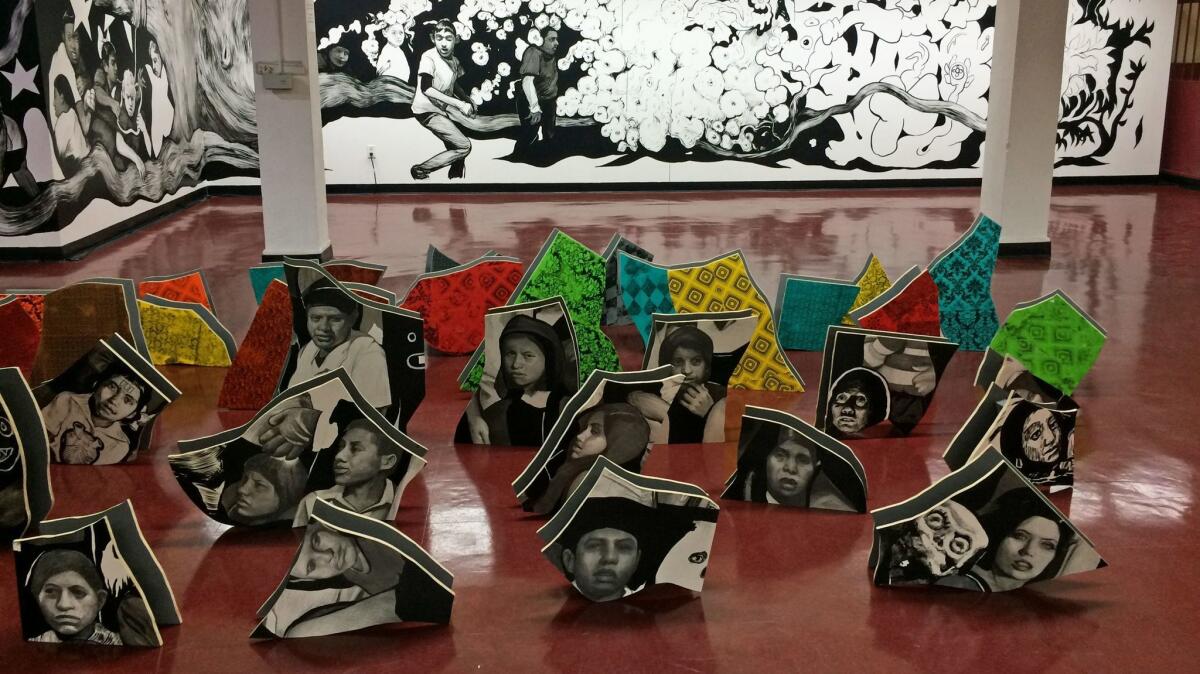
For Crosthwaite, painting in public is part of his practice. In November, he and artist Jose Hugo Sanchez participated in creating a work at the San Diego Art Institute in a what was billed as a “mano a mano” mural competition, a “live durational performance” that took place over five days as each artist began painting at opposite ends of a 16-foot wall on Nov. 7 and met in the middle on Nov. 11. The resulting mural is on view through Jan. 7.
Yet even with many public murals under his belt, Crosthwaite says working in the Museum of Social Justice space was a singular experience.
“This is the only time I’ve had poets come recite me their poetry,” he says. “L.A. is a very literary city.”

+++++
Where: Museum of Social Justice, La Plaza United Methodist Church, 115 Paseo de la Plaza, Los Angeles
When: Through March 4
Info: museumofsocialjustice.org
THE YEAR IN REVIEW: 2017 in Arts and Entertainment
Sign up for our weekly Essential Arts & Culture newsletter »
ALSO
Studio Visit: Hugo Crosthwaite and a Giant Dashboard Jesus, channeling Tijuana’s just-do-it spirit
Q&A: Hugo Crosthwaite on Tijuana, Mexico’s missing, the power of comic books
Review: Hugo Crosthwaite on the border and a sorrowful loss
An exhibition on L.A.’s queer Chicano networks shows how California artists connected with the world
‘Unsettled’ explores the terrain — physical and political — of the West
More to Read
The biggest entertainment stories
Get our big stories about Hollywood, film, television, music, arts, culture and more right in your inbox as soon as they publish.
You may occasionally receive promotional content from the Los Angeles Times.

